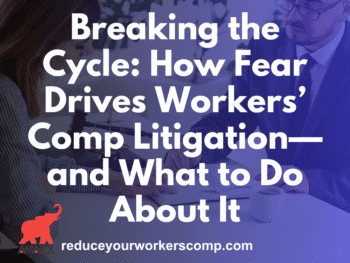Imagine the following scenario when handling a workers’ compensation claim:
- John Doe is a construction worker who shows up for work on Monday morning appearing to being “a little off his game.” Shortly after starting work he falls from some scaffolding and suffers a severe work injury. Following the accident, he was taken to a hospital. Post-injury blood testing is performed and it is determined his blood alcohol level is three times the legal limit. Sounds like an easy case for maintaining a denial of primary liability related to the work injury, right?
Sadly, this is not the case.
Click Link to Access Free PDF Download
“Avoid the 3 Primary Reasons Injured Workers’ Hire Attorneys”
What is the “Intoxication Defense?”
Under most workers’ compensation laws, employers and insurers can successfully deny primary liability related to injuries sustained when an employee is “intoxicated.” This defense is not limited to being impacted by alcohol. It can also include intoxication from street drugs or other controlled substances.
Questions as to Legal Causation
Notwithstanding the obvious impairment in the above situation, the ultimate question for the courts is typically one of the legal or proximate cause of the work injury. One example of this issue came into play in Kowalik v. Martinson Construction, July 8, 2004, MN WCCA.
In Kowalik, the employee suffered injuries from a fall while being significantly intoxicated. At hearing, testimony was presented that the employee was able to function at work despite his state of drunkenness. It was also noted he was a capable carpenter. The court found the injury to be compensable based on the finding of fact the fall was caused by loose subfascia at the construction site and not the employee’s intoxication.
The successful assertion of this affirmative defense fails on a frequent basis. This is based on the requirement that the party seeking to defend the case on these ground prove the following elements:
- The employee was intoxicated at the time of the injury; and
- The intoxication was the proximate or legal cause of the injury.
Failing to prove both elements can be fatal to defending a workers’ compensation case.
Other Legal Barriers
Stakeholders in the workers’ compensation system seeking to assert successfully this defense have other legal barriers. These include the following:
- Challenges to the accuracy of the testing;
- Questions as to whether the Employee did not unlawfully use the substance in question;
- Passive ingestion or inhalation of a controlled substance. Given the increasing legalization of marijuana on the state level, this will be a question for the courts to review; and
- Issues concerning the disabling impact of a controlled substance. This will again be an issue due to the prevalent use of marijuana recreationally. An injured worker may argue that although the substance is present in their system, it was not disabling and merely residual.
Practice Pointers for Asserting the Defense
All members of the claims management team need to take a proactive approach when handling cases where an intoxication defense can render a claim non-compensable.
- Selecting the proper expert is central to these cases. Part of this will include having an expert testify that the intoxication, and no other factors was the legal cause of the work injury. This is important given the result in Kowalik.
- Rapid post-injury response that includes post-injury drug and alcohol testing.
- Training managers and supervisors to recognize employees who may be intoxicated in the work place. This goes beyond the common signs of intoxication such as stumbling, stammering and poor coordination.
Author Michael Stack, Principal, COMPClub, Amaxx LLC. He is an expert in workers compensation cost containment systems and helps employers reduce their work comp costs by 20% to 50%. He works as a consultant to large and mid-market clients, is co-author of Your Ultimate Guide To Mastering Workers Comp Costs, a comprehensive step-by-step manual of cost containment strategies based on hands-on field experience, and founder of COMPClub, an exclusive member training program on workers compensation cost containment best practices. Through these platforms he is in the trenches on a monthly basis working together with clients to implement and define best practices, which allows him to continuously be at the forefront of innovation and thought leadership in workers’ compensation cost containment. Contact: mstack@reduceyourworkerscomp.com.
©2015 Amaxx LLC. All rights reserved under International Copyright Law.
Do not use this information without independent verification. All state laws vary. You should consult with your insurance broker, attorney, or qualified professional.















